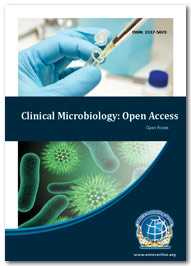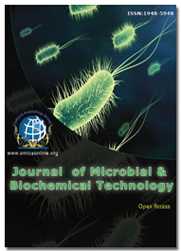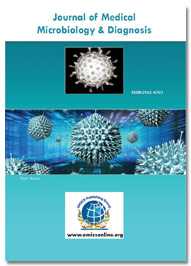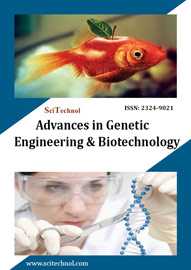Theme: Revealing the Innovations in Microbial Physiology and Genomics
Microbial Physiology 2017
Track 1: Microbial physiology
Microbial Physiology: This is the computing of life as mediate by cell structures growth factors ,metabolism and genetic arrangement of microorganisms Introduces the inter relatedness of microbiology ,biochemistry, genetic science within the context of functioning of bacterial cell. Prokaryotic are having cells that lack membrane-bound nuclei and eukaryotic are having cells with `good' or membrane-bound nuclei microorganisms-Comparison, Flagella, motility and method of chemo taxis- uptake and utilization of substance, a gamogenesis and beginning,- two element signal transduction. Microbial nutrition and cytogeny,-physiological and nutritional obligations of Cells - batch, continuous and synchronous cultures, growth kinetics – management of microbial growth. Microbial biofilms - The physiology and collective refractoriness of microorganism biofilm communities: assemblage sensing and ending mechanisms. Microorganism stress responses: Heat, temperature, pH microorganism energy stores, microorganism cells and applications. Special importance is placed on demonstrating the role of prokaryotic structures in about adaptation, unwellness constitution, and their potential as targets for the event of antibiotics and/or medicine.
Relevant Conferences:
Conference on Pharmaceutical Microbiology, 18-19 January, 2017, London, UK ; Conference on Genomics and Clinical Microbiology 22-27 January, 2017 ,Cambridge, UK; Conference on Micro biome in Health and Disease, 05-09 February, 2017, USA ; Antimicrobial Peptides, February 26 - March 3, 2017 ,USA; 3rd International Conference on Biogas Microbiology, 1 -3 May 2017 , Wageningen UR;7th congress of European microbiologists, 9-13 July,2017, Valencia, spain; The Microbiology Society Annual Conference 2017, 3-6 April 2017,Edinburgh, UK
Related Societies:
Society for Applied Microbiology, UK; Microbiology Society, UK; Society for Industrial Microbiology and Biotechnology, USA; Scottish Microbiology Association, UK; Society for General Microbiology, USA; Society for the Control of Antimicrobial Resistance, Ireland; Welsh Microbiology Association ,UK; Alliance for the Prudent Use of Antibiotics,USA; American Phytopathological Society,USA; Association of Medical Microbiology and Infectious Disease , Canada; British Society for Parasitology, England; British Society for Plant Pathology,England; Center for Microbial Oceanography: Research and Education, USA.
Track 2: Metabolism Diversity in Microbes
A lot of action is made about microbial diversity. The unicellular eukaryotes (protista) exhibit a fair amount of structural diversity, but the prokaryotes (bacilli and archaea) lack this distinction. There are but a few basic morphologies, the prospects of sensitivity and assemblage cells (spores), and a major differential stains (the Gram stain) that distinguish a unicellular organism having cells lacking membrane-bound nuclei, microscopically. So what is all the activity about respecting prokaryotes? It is about biochemical process or metabolic diversity, especially as it describes to energy-generating metabolism and biogenesis of secondary substance. The organisms, as a group, conduct all the same types of basic biological processes as eukaryotes, but, in addition, there are several types of energy-generating metabolism among the bacteria’s that are non-existent in eukaryotic cells or structures. The diversity of prokaryotes is expressed by their great variation in conditions of energy origination and metabolism, and this particularity allows prokaryotes to flourish in all biospheres suitable for life on earth.
Relevant Conferences:
7th congress of European microbiologists, 9-13 July,2017, Valencia, spain; The Microbiology Society Annual Conference 2017, 3-6 April 2017,Edinburgh, UK; Conference on Applied bioinformatics and public health microbiology, 17-19 May-2017,Cambridge,UK; 4th annual microbiology &infectious diseases congress, 10-11 October 2017, Singapore; UNC Water Microbiology Conference 2017, 15-17 May,2017, Chapel Hill, USA; International Union of Microbiological Societies Congresses, 17 - 21 July 2017 ,Marina Bay Sands, Singapore; Applied & Environmental Microbiology, 15-16 July, 2017, Massachusetts, United States; 67th Canadian Society of Microbiologists Annual Meeting, 20-23 June, 2017 Waterloo, Ontario; asm microbe 2017, 1-5 June, 2017 , New Orleans, United States;
Related Societies:
Society for Applied Microbiology, UK; Microbiology Society, UK; Society for Industrial Microbiology and Biotechnology, USA; Scottish Microbiology Association, UK; Society for General Microbiology, USA; Society for the Control of Antimicrobial Resistance, Ireland; Welsh Microbiology Association ,UK; Alliance for the Prudent Use of Antibiotics,USA; American Phytopathological Society,USA; Association of Medical Microbiology and Infectious Disease , Canada; British Society for Parasitology, England; British Society for Plant Pathology,England; Center for Microbial Oceanography: Research and Education, USA.
Track 3: Microbes and Environments
Microorganisms are launch on nearly every liveable square inch of the planet. They live and thrive in all parts of the planet where there is liquid water, including hostile environments such as the poles, deserts, geysers, xenolith, and the deep hydrosphere. Additionally, while disease-causing bacterium is often free-living, many have intimate symbiotic relationships with other larger aerobes. Clearly, microbes have adapted to extreme and intolerant conditions, and it is this version that has yielded tremendous biological diversity among microorganism.
Relevant Conferences:
Conference on Pharmaceutical Microbiology, 18-19 January, 2017, London, UK ; Conference on Genomics and Clinical Microbiology 22-27 January, 2017 ,Cambridge, UK; Conference on Micro biome in Health and Disease, 05-09 February, 2017, USA ; Antimicrobial Peptides, February 26 - March 3, 2017 ,USA; 3rd International Conference on Biogas Microbiology, 1 -3 May 2017 , Wageningen UR;7th congress of European microbiologists, 9-13 July,2017, Valencia, spain; The Microbiology Society Annual Conference 2017, 3-6 April 2017,Edinburgh, UK
Related Societies:
Society for Applied Microbiology, UK; Microbiology Society, UK; Society for Industrial Microbiology and Biotechnology, USA; Scottish Microbiology Association, UK; Society for General Microbiology, USA; Society for the Control of Antimicrobial Resistance, Ireland; Welsh Microbiology Association ,UK; Alliance for the Prudent Use of Antibiotics,USA; American Phytopathological Society,USA; Association of Medical Microbiology and Infectious Disease , Canada; British Society for Parasitology, England; British Society for Plant Pathology,England; Center for Microbial Oceanography: Research and Education, USA.
Track 4: Microbial Metabolism
Metabolism adverts to all the biochemical process that occurs in a cell or organism. The study of bacterial metabolism centring on the chemical diverseness of substance oxidations and dissimilation reactions (reactions by which substrate fragment are broken down), which normally purpose in bacteria to generate energy. Also within the scope of bacterial metabolism is the study of the uptake and exploitation of the inorganic or organic compounds required for growth and maintenance of a cellular stable state (developmental learning reactions). These respective exergonic (energy-yielding) and endergonic (energy-requiring) reactions are assembled within the living bacterial cell by integrated enzyme systems, the end result being self-replication of the cell. The capablenes of microbe cells to live, function, and replicate in an appropriate chemical milieu (such as a microorganism culture medium) and the chemical changes that result during this transformation represent the scope of bacterial metabolism.
Relevant Conferences:
7th congress of European microbiologists, 9-13 July,2017, Valencia, spain; The Microbiology Society Annual Conference 2017, 3-6 April 2017,Edinburgh, UK; Conference on Applied bioinformatics and public health microbiology, 17-19 May-2017,Cambridge,UK; 4th annual microbiology &infectious diseases congress, 10-11 October 2017, Singapore; UNC Water Microbiology Conference 2017, 15-17 May,2017, Chapel Hill, USA; International Union of Microbiological Societies Congresses, 17 - 21 July 2017 ,Marina Bay Sands, Singapore; Applied & Environmental Microbiology, 15-16 July, 2017, Massachusetts, United States; 67th Canadian Society of Microbiologists Annual Meeting, 20-23 June, 2017 Waterloo, Ontario; asm microbe 2017, 1-5 June, 2017 , New Orleans, United States;
Related Societies:
Society for Applied Microbiology, UK; Microbiology Society, UK; Society for Industrial Microbiology and Biotechnology, USA; Scottish Microbiology Association, UK; Society for General Microbiology, USA; Society for the Control of Antimicrobial Resistance, Ireland; Welsh Microbiology Association ,UK; Alliance for the Prudent Use of Antibiotics,USA; American Phytopathological Society,USA; Association of Medical Microbiology and Infectious Disease , Canada; British Society for Parasitology, England; British Society for Plant Pathology,England; Center for Microbial Oceanography: Research and Education, USA.
Track 5: Advanced Microbial Genetics
Prokaryotic gene expression features of bacterial approve, infinitesimal of transcription initiations and termination. Ordinance of gene expression: transcriptional regulation in bacteria; repressors and activators, positive and negative prescript attenuation and feedback restraint. Mechanism of DNA uptake during transformation. Genetics of bacteriophages: lytic development cycle, phage DNA replication. Universalised transduction, lysogeny and specialized transduction, Transposition and non-homologous recombination, DNA repair and mutation. These include, but are not limited to, cell wall and other secondary metabolite biogenesis, intracellular signalling, cell-to-cell communication, protein secretion, and bacterial genomics.
Relevant Conferences:
Conference on Pharmaceutical Microbiology, 18-19 January, 2017, London, UK ; Conference on Genomics and Clinical Microbiology 22-27 January, 2017 ,Cambridge, UK; Conference on Micro biome in Health and Disease, 05-09 February, 2017, USA ; Antimicrobial Peptides, February 26 - March 3, 2017 ,USA; 3rd International Conference on Biogas Microbiology, 1 -3 May 2017 , Wageningen UR;7th congress of European microbiologists, 9-13 July,2017, Valencia, spain; The Microbiology Society Annual Conference 2017, 3-6 April 2017,Edinburgh, UK
Related Societies:
Society for Applied Microbiology, UK; Microbiology Society, UK; Society for Industrial Microbiology and Biotechnology, USA; Scottish Microbiology Association, UK; Society for General Microbiology, USA; Society for the Control of Antimicrobial Resistance, Ireland; Welsh Microbiology Association ,UK; Alliance for the Prudent Use of Antibiotics,USA; American Phytopathological Society,USA; Association of Medical Microbiology and Infectious Disease , Canada; British Society for Parasitology, England; British Society for Plant Pathology,England; Center for Microbial Oceanography: Research and Education, USA.
Track 6: Microbial Evolution, Phylogeny and Diversity
The proof for evolution is compelling and intensive. Observing each level of organization in living systems, biologists see the signature of past and gift evolution. Darwin dedicated an oversized portion of his book, On the Origin of Species, to distinguishing patterns in nature that were per evolution. Microorganism is terribly numerous. They embrace organisms, fungi, algae, and protozoa; microscopic plants (green algae); and animals like rotifers and planarians. Many microorganisms area unit living thing (single-celled), however this can be not universal. Together with Thermotogae, members of Aquificae are thermophiles eubacteria.
Relevant Conferences:
Conference on Pharmaceutical Microbiology, 18-19 January, 2017, London, UK ; Conference on Genomics and Clinical Microbiology 22-27 January, 2017 ,Cambridge, UK; Conference on Micro biome in Health and Disease, 05-09 February, 2017, USA ; Antimicrobial Peptides, February 26 - March 3, 2017 ,USA; 3rd International Conference on Biogas Microbiology, 1 -3 May 2017 , Wageningen UR;7th congress of European microbiologists, 9-13 July,2017, Valencia, spain; The Microbiology Society Annual Conference 2017, 3-6 April 2017,Edinburgh, UK
Related Societies:
Society for Applied Microbiology, UK; Microbiology Society, UK; Society for Industrial Microbiology and Biotechnology, USA; Scottish Microbiology Association, UK; Society for General Microbiology, USA; Society for the Control of Antimicrobial Resistance, Ireland; Welsh Microbiology Association ,UK; Alliance for the Prudent Use of Antibiotics,USA; American Phytopathological Society,USA; Association of Medical Microbiology and Infectious Disease , Canada; British Society for Parasitology, England; British Society for Plant Pathology,England; Center for Microbial Oceanography: Research and Education, USA.
Track 7: Host-Microbe Interactions:
Host-Microbe interactions are the collaborations occurring between a pathogen (e.g. infection, microscopic organisms) and their host (e.g. people, plants). The host-pathogen interface presents intriguing cell changes perceptible under electron microscope - occurrence to the pathogens for upgraded harmfulness, including arrangement of surface "invasosomal" periplasmic organelles and exocytosis of bacterial external film vesicles by gram-negative pathogens. Host cell cytoskeletal reorganizational changes e.g., unsettle development, adjusted phagocytosis; and so on additionally occur as a prelude to microbial attack.
Relevant Conferences:
7th congress of European microbiologists, 9-13 July,2017, Valencia, spain; The Microbiology Society Annual Conference 2017, 3-6 April 2017,Edinburgh, UK; Conference on Applied bioinformatics and public health microbiology, 17-19 May-2017,Cambridge,UK; 4th annual microbiology &infectious diseases congress, 10-11 October 2017, Singapore; UNC Water Microbiology Conference 2017, 15-17 May,2017, Chapel Hill, USA; International Union of Microbiological Societies Congresses, 17 - 21 July 2017 ,Marina Bay Sands, Singapore; Applied & Environmental Microbiology, 15-16 July, 2017, Massachusetts, United States; 67th Canadian Society of Microbiologists Annual Meeting, 20-23 June, 2017 Waterloo, Ontario; asm microbe 2017, 1-5 June, 2017 , New Orleans, United States;
Related Societies:
Society for Applied Microbiology, UK; Microbiology Society, UK; Society for Industrial Microbiology and Biotechnology, USA; Scottish Microbiology Association, UK; Society for General Microbiology, USA; Society for the Control of Antimicrobial Resistance, Ireland; Welsh Microbiology Association ,UK; Alliance for the Prudent Use of Antibiotics,USA; American Phytopathological Society,USA; Association of Medical Microbiology and Infectious Disease , Canada; British Society for Parasitology, England; British Society for Plant Pathology,England; Center for Microbial Oceanography: Research and Education, USA.
Track 8: Industrial Microbiology
There are many sorts of industrial processes wherever microorganisms Greek deity accustomed manufacture fascinating finish product that have well outlined industrial uses and applications. These could also be generally classified into the subsequent teams. Microorganisms themselves square measure cultivated on an oversized scale to be used as food and animal feed. Yeast, fungi, and protoctist are made from media containing inorganic element supply and different without delay offered and low cost nutrients. Such food product are sensible sources of macromolecule, vitamins, and different organic supplements. In recent years microbial processes are used for big scale deed, of amino acids. Fruit juices and extract of meadow grass are soured with the production of brewage, wine, and variety alcoholic beverages. Manufacture of assorted chemicals. Microorganisms ferment numerous substances, typically carbohydrates, in nutrient media. They manufacture a spread of chemicals (various alcohols, carboxylic acid, carboxylic acid, acid, gluconic acid, etc.) that are being recovered, pure and sold.
Relevant Conferences:
Conference on Pharmaceutical Microbiology, 18-19 January, 2017, London, UK ; Conference on Genomics and Clinical Microbiology 22-27 January, 2017 ,Cambridge, UK; Conference on Micro biome in Health and Disease, 05-09 February, 2017, USA ; Antimicrobial Peptides, February 26 - March 3, 2017 ,USA; 3rd International Conference on Biogas Microbiology, 1 -3 May 2017 , Wageningen UR;7th congress of European microbiologists, 9-13 July,2017, Valencia, spain; The Microbiology Society Annual Conference 2017, 3-6 April 2017,Edinburgh, UK
Related Societies:
Society for Applied Microbiology, UK; Microbiology Society, UK; Society for Industrial Microbiology and Biotechnology, USA; Scottish Microbiology Association, UK; Society for General Microbiology, USA; Society for the Control of Antimicrobial Resistance, Ireland; Welsh Microbiology Association ,UK; Alliance for the Prudent Use of Antibiotics,USA; American Phytopathological Society,USA; Association of Medical Microbiology and Infectious Disease , Canada; British Society for Parasitology, England; British Society for Plant Pathology,England; Center for Microbial Oceanography: Research and Education, USA.
Track 9: Microbial Ecology
Microbial ecology is that the study of microbes inside the setting and their interactions with each other. Microbes are the tiniest creatures on Earth, yet despite their very little size, they have a colossal impact on North Yankee nation and on our surroundings. Microbial ecology can show North Yankee nation our place inside the cosmos -- but life originated and also the approach it evolved, and also the approach we've an inclination to are related to the nice diversity of all various organisms.
Relevant Conferences:
7th congress of European microbiologists, 9-13 July,2017, Valencia, spain; The Microbiology Society Annual Conference 2017, 3-6 April 2017,Edinburgh, UK; Conference on Applied bioinformatics and public health microbiology, 17-19 May-2017,Cambridge,UK; 4th annual microbiology &infectious diseases congress, 10-11 October 2017, Singapore; UNC Water Microbiology Conference 2017, 15-17 May,2017, Chapel Hill, USA; International Union of Microbiological Societies Congresses, 17 - 21 July 2017 ,Marina Bay Sands, Singapore; Applied & Environmental Microbiology, 15-16 July, 2017, Massachusetts, United States; 67th Canadian Society of Microbiologists Annual Meeting, 20-23 June, 2017 Waterloo, Ontario; asm microbe 2017, 1-5 June, 2017 , New Orleans, United States;
Related Societies:
Society for Applied Microbiology, UK; Microbiology Society, UK; Society for Industrial Microbiology and Biotechnology, USA; Scottish Microbiology Association, UK; Society for General Microbiology, USA; Society for the Control of Antimicrobial Resistance, Ireland; Welsh Microbiology Association ,UK; Alliance for the Prudent Use of Antibiotics,USA; American Phytopathological Society,USA; Association of Medical Microbiology and Infectious Disease , Canada; British Society for Parasitology, England; British Society for Plant Pathology,England; Center for Microbial Oceanography: Research and Education, USA.
Track 10: Microbial Diseases
A microorganism may be a microbe that has the potential to cause sickness. An infection is that the invasion and multiplication of infective microbes in a private or population. Disease is once the infection causes injury to the individual’s important functions or systems. An infection doesn't invariably lead to disease. To cause an infection, microbes should enter our bodies. Microbes will enter the body through the four sites listed below:
Respiratory tract (mouth and nose) e.g. respiratory disease virus that causes the contagious disease. Gastrointestinal tract (mouth oral cavity) e.g. eubacteria epidemic cholera that causes cholera. Urogenital tract e.g. Escherichia that causes urinary tract infection. Breaks within the skin surface e.g. eubacteria tetani that causes tetanus.
Relevant Conferences:
Conference on Pharmaceutical Microbiology, 18-19 January, 2017, London, UK ; Conference on Genomics and Clinical Microbiology 22-27 January, 2017 ,Cambridge, UK; Conference on Micro biome in Health and Disease, 05-09 February, 2017, USA ; Antimicrobial Peptides, February 26 - March 3, 2017 ,USA; 3rd International Conference on Biogas Microbiology, 1 -3 May 2017 , Wageningen UR;7th congress of European microbiologists, 9-13 July,2017, Valencia, spain; The Microbiology Society Annual Conference 2017, 3-6 April 2017,Edinburgh, UK
Related Societies:
Society for Applied Microbiology, UK; Microbiology Society, UK; Society for Industrial Microbiology and Biotechnology, USA; Scottish Microbiology Association, UK; Society for General Microbiology, USA; Society for the Control of Antimicrobial Resistance, Ireland; Welsh Microbiology Association ,UK; Alliance for the Prudent Use of Antibiotics,USA; American Phytopathological Society,USA; Association of Medical Microbiology and Infectious Disease , Canada; British Society for Parasitology, England; British Society for Plant Pathology,England; Center for Microbial Oceanography: Research and Education, USA.
Track 11: Bacterial Physiology
Bacterial physiology is an exploratory order that worries the life-supporting capacities and procedures of microscopic organisms, which permit bacterial cells to develop and imitate. The biochemical responses that together empower microorganisms to live, develop, and imitate. Entirely, digestion system portrays the aggregate compound responses that occur in a cell, while physiology depicts the part of metabolic responses in the life procedures of a bacterium. The investigation of microorganisms has centrality outside the ability to comprehend of microscopic organisms themselves. Since microscopic organisms are bottomless, effortlessly developed, and moderately basic in cell association, they have been utilized widely as a part of natural examination. Utilitarian examinations of bacterial frameworks have given an establishment to a great part of the current itemized learning about atomic science and hereditary qualities. Microorganisms are prokaryotes, without the convoluted cell association found in higher living beings; they have no atomic envelope and no specific organelles. However they take part in all the essential life forms—transport of materials into and out of the cell, catabolism and anabolism of complex natural atoms, and the support of auxiliary uprightness. To finish this, microorganisms must get supplements and change over them into a type of vitality that is valuable to the cell.
Relevant Conferences:
7th congress of European microbiologists, 9-13 July,2017, Valencia, spain; The Microbiology Society Annual Conference 2017, 3-6 April 2017,Edinburgh, UK; Conference on Applied bioinformatics and public health microbiology, 17-19 May-2017,Cambridge,UK; 4th annual microbiology &infectious diseases congress, 10-11 October 2017, Singapore; UNC Water Microbiology Conference 2017, 15-17 May,2017, Chapel Hill, USA; International Union of Microbiological Societies Congresses, 17 - 21 July 2017 ,Marina Bay Sands, Singapore; Applied & Environmental Microbiology, 15-16 July, 2017, Massachusetts, United States; 67th Canadian Society of Microbiologists Annual Meeting, 20-23 June, 2017 Waterloo, Ontario; asm microbe 2017, 1-5 June, 2017 , New Orleans, United States;
Related Societies:
Society for Applied Microbiology, UK; Microbiology Society, UK; Society for Industrial Microbiology and Biotechnology, USA; Scottish Microbiology Association, UK; Society for General Microbiology, USA; Society for the Control of Antimicrobial Resistance, Ireland; Welsh Microbiology Association ,UK; Alliance for the Prudent Use of Antibiotics,USA; American Phytopathological Society,USA; Association of Medical Microbiology and Infectious Disease , Canada; British Society for Parasitology, England; British Society for Plant Pathology,England; Center for Microbial Oceanography: Research and Education, USA.
Track 12: Molecular Microbiology
Molecular microbiology deals with sub-atomic instruments and physiological procedures of microorganisms and their usage underway of biotechnology items and pharmaceuticals, for example, immunizations, antibodies. It additionally includes headway in pathogenicity of microorganisms. Atomic microbiology is a quickly extending territory of contemporary science: the utilization of sub-atomic science has opened up the microbial world in numerous noteworthy ways. The fascination of microorganisms is that they are independent and that they offer complete answers for comprehension the marvel of life.
Atomic Microbiology analyzes methods to recognize singular pathogens, as well as investigates the developing pattern toward a frameworks approach for diagnosing irresistible sicknesses, with parts covering gastrointestinal diseases, sepsis, meningitis, and encephalitis. To put it plainly, this content not just epitomizes the momentum condition of the science, additionally indicates new roads for examination that will expand the application and convenience of sub-atomic diagnostics.
Relevant Conferences:
Conference on Pharmaceutical Microbiology, 18-19 January, 2017, London, UK ; Conference on Genomics and Clinical Microbiology 22-27 January, 2017 ,Cambridge, UK; Conference on Micro biome in Health and Disease, 05-09 February, 2017, USA ; Antimicrobial Peptides, February 26 - March 3, 2017 ,USA; 3rd International Conference on Biogas Microbiology, 1 -3 May 2017 , Wageningen UR;7th congress of European microbiologists, 9-13 July,2017, Valencia, spain; The Microbiology Society Annual Conference 2017, 3-6 April 2017,Edinburgh, UK
Related Societies:
Society for Applied Microbiology, UK; Microbiology Society, UK; Society for Industrial Microbiology and Biotechnology, USA; Scottish Microbiology Association, UK; Society for General Microbiology, USA; Society for the Control of Antimicrobial Resistance, Ireland; Welsh Microbiology Association ,UK; Alliance for the Prudent Use of Antibiotics,USA; American Phytopathological Society,USA; Association of Medical Microbiology and Infectious Disease , Canada; British Society for Parasitology, England; British Society for Plant Pathology,England; Center for Microbial Oceanography: Research and Education, USA.
Track 13: Microbial Genomics and Genome Sequencing
Genomics is a discipline in genetics that applies recombinant DNA, DNA sequencing techniques, and bioinformatics to grouping, amass, and dissect the capacity and structure of genomes (the complete arrangement of DNA inside a solitary cell of an organism).Advances in genomics have set off an upheaval in disclosure based exploration to see even the most complex natural frameworks, for example, the brain.The field incorporates endeavors to decide the whole DNA succession of living beings and fine-scale hereditary mapping. The field likewise incorporates investigations of intragenomic wonders, for example, heterosis, epistasis, pleiotropy and different collaborations amongst loci and alleles inside the genome.conversely, the examination of the parts and elements of single qualities is an essential center of atomic science or hereditary qualities and is a typical theme of advanced restorative and organic exploration.
Relevant Conferences:
7th congress of European microbiologists, 9-13 July,2017, Valencia, spain; The Microbiology Society Annual Conference 2017, 3-6 April 2017,Edinburgh, UK; Conference on Applied bioinformatics and public health microbiology, 17-19 May-2017,Cambridge,UK; 4th annual microbiology &infectious diseases congress, 10-11 October 2017, Singapore; UNC Water Microbiology Conference 2017, 15-17 May,2017, Chapel Hill, USA; International Union of Microbiological Societies Congresses, 17 - 21 July 2017 ,Marina Bay Sands, Singapore; Applied & Environmental Microbiology, 15-16 July, 2017, Massachusetts, United States; 67th Canadian Society of Microbiologists Annual Meeting, 20-23 June, 2017 Waterloo, Ontario; asm microbe 2017, 1-5 June, 2017 , New Orleans, United States;
Related Societies:
Society for Applied Microbiology, UK; Microbiology Society, UK; Society for Industrial Microbiology and Biotechnology, USA; Scottish Microbiology Association, UK; Society for General Microbiology, USA; Society for the Control of Antimicrobial Resistance, Ireland; Welsh Microbiology Association ,UK; Alliance for the Prudent Use of Antibiotics,USA; American Phytopathological Society,USA; Association of Medical Microbiology and Infectious Disease , Canada; British Society for Parasitology, England; British Society for Plant Pathology,England; Center for Microbial Oceanography: Research and Education, USA.
Track 14: Microbiology & Infectious Diseases
Infectious diseases are disorders caused by organisms such as bacteria, viruses, fungi or parasites. Microorganisms that cause illness are all things considered called pathogens. Numerous living beings live in and on our bodies. They're regularly safe or even supportive, yet under specific conditions, a few creatures may bring about illness. Some irresistible illnesses can be passed from individual to individual. Some irresistible sicknesses can be passed from individual to individual. Some are transmitted by nibbles from bugs or creatures. Also, others are obtained by ingesting sullied sustenance or water or being presented to life forms in nature. Signs and side effects fluctuate contingent upon the life form bringing on the contamination, yet regularly incorporate fever and weariness. Mellow contaminations may react to rest and home cures, while some life-undermining diseases may require hospitalization. Numerous irresistible illnesses, for example, measles and chickenpox, can be anticipated by antibodies. Regular and intensive hand-washing additionally shields you from most irresistible illnesses.
Relevant Conferences:
Conference on Pharmaceutical Microbiology, 18-19 January, 2017, London, UK ; Conference on Genomics and Clinical Microbiology 22-27 January, 2017 ,Cambridge, UK; Conference on Micro biome in Health and Disease, 05-09 February, 2017, USA ; Antimicrobial Peptides, February 26 - March 3, 2017 ,USA; 3rd International Conference on Biogas Microbiology, 1 -3 May 2017 , Wageningen UR;7th congress of European microbiologists, 9-13 July,2017, Valencia, spain; The Microbiology Society Annual Conference 2017, 3-6 April 2017,Edinburgh, UK
Related Societies:
Society for Applied Microbiology, UK; Microbiology Society, UK; Society for Industrial Microbiology and Biotechnology, USA; Scottish Microbiology Association, UK; Society for General Microbiology, USA; Society for the Control of Antimicrobial Resistance, Ireland; Welsh Microbiology Association ,UK; Alliance for the Prudent Use of Antibiotics,USA; American Phytopathological Society,USA; Association of Medical Microbiology and Infectious Disease , Canada; British Society for Parasitology, England; British Society for Plant Pathology,England; Center for Microbial Oceanography: Research and Education, USA.
ConferenceSeries Ltd invites all the participants from all over the world to attend '6th International Conference on Microbial Physiology and Genomics' during August 31-September 1, 2017 Brussels, BelgiumAugust 31-September 1, 2017 Brussels, Belgium,which includes prompt keynote presentations, Oral talks, Poster presentations and Exhibitions.
Microbial Physiology 2017 provides a forum for the presentation and discussion of cutting-edge science in Microbiology. The aim of this essential international gathering is to provide various topics in Microbial Physiology with key disciplines including Microbial Metabolism, Industrial Microbiology, Molecular approaches, Microbial Genetics, Biodiversity, Bioremediation, Eukaryotic microbes, virology and others will be examined in order to advance our understanding of current and future challenges.
Why to attend?
Best platform to develop new partnership & collaborations.
Best location to speed up your route into every territory in the World.
89% our conference attendees are the Key contact in their labs purchasing decisions.
Our exhibitor booths were visited 4-5 times by 80% of the attendees during the conference.
Past exhibitor’s feedback reveals ample of enquiries perceived from the conference attendees.
Network development with both Academia and Business.
Target Audience:
We invite experts in the field of clinical microbiology including bacteriologist, virologist, molecular microbiologist, infection and quality control clinicians, exercise physicians, yoga practitioners, veterinary microbiologist and delegates from industries focusing on microbiology, molecular genomics and industrialist involved in biomedical research as well.
Microbial physiology is the study of microbial structure and function, in particular, how microbial activity responds to changes in the environment. It is therefore the key to controlling detrimental aspects of microbes, and to exploiting them for the good of the human race. Microbial physiology and Genetics Conference provide a platform for discussing on Microbial biodiversity at the structural level: Composition of the average bacterial cell, basic bacterial cell structure in comparison to a model eukaryotic cell (yeast). Gram positive and gram negative. Peptidoglycan and Lps and their importance in pathogenesis. Introduction to growth, fuelling and biosynthesis: Division by binary fission, including growth equations. Nutritional and non-nutritional factors affecting growth (temperature, osmolarity, pH and antibiotics), Physiological state and balanced growth, and Adaptation to extreme conditions. Microbial biodiversity at the physiological and biochemical level: The diversity in bacterial metabolism (nutrient sources (particularly carbon and nitrogen)), photosynthesis, aerobic and anaerobic growth and alternative terminal electron acceptors. Synthesis, localisation and assembly of macromolecular structures: DNA replication and transcription. Signalling and physiological control: Introduction to bacterial genetics. Microbial gene expression at the transcriptional and post-transcriptional level in response to a model factor (iron availability – the Fur/RyhB regulon) and vaccinations along with the microbial diseases.
Why in Brussels?
Brussels is one of the most international cities in the world. Apart from being the centre of European politics, Find out more about the interesting facts of Brussels through a mixture of facts, history, cultural traditions and political infrastructure. Throughout the ages Brussels city has been the home of kings, the hub of activity for trade and enterprise from porcelain to tapestries and to this day you can still see the outline of the original city walls built into the modern cityscape. Brussels’ climate is temperate and mild with winter lows of about 1°C and summer highs of around 23°C.
The following institutions are now operating from Brussels: the European Commission, the European Parliament and NATO (the North Atlantic Treaty Organisation). In recent times the European Council has started to hold all quarterly summits in Brussels. Apart from the European institutions in Brussels, in view of democracy, Brussels has a regional government (Brussels Region) and 19 communes handling the activities of each area of the city. Each commune has its own mayor and cabinet. Beer, waffles and chocolate are usually the first trades that come to mind when talking about Belgium or Brussels. There are many other enterprises in Brussels which make up this economy as it handles its role as capital of Belgium and an international hub for foreign dignitaries, diplomats and expatriates. If you are staying in Brussels for more than just a couple of days, as usual tourists do, you will get a chance to experience the city and everyday life from more local perspective. Read about the 8 things you shouldn't miss while being in Brussels - what makes this city special. Brussels is a city with centuries of history. Today, it continues to take part on the international stage. But there are a few curious things that have originated in Brussels that have inspired food, photographers, vegetables and animal lovers around the world to be named after it. In this section you will find some real life examples of how Brussels is going down in history in all parts of the world.
Market:
The Global microbiology market is growing due to increase in prevalence of pathogenic diseases, growth in discovery of mutating and adapting bacterium, and the growing need for speedy microbiological testing methods.
In 2013, the microbiology testing market accounted for 5% in the global IVD market and contributed $3556.7 million in 2013 to the IVD market, and is estimated to reach $4737.2 million by 2018, at a CAGR of 6.2% from 2013 to 2018.
The report ‘Global Microbiology Market forecast for 2018’ analyzes the market by segments such as instruments and reagents. These two segments experienced a positive growth till 2013, with a market value of $3.55 billion, comprising of $2.99 billion for reagents and $0.55 billion for instruments. It is expected to grow at a CAGR of 6.2%.
The Americas commanded the largest share of 42% in the global microbiology market at $1485.02 million in 2013, and is expected to reach $1932.8 million by 2018, at a CAGR of 5.6% from 2013 to 2018.
The U.S. commanded the largest share of 89% in the American microbiology IVD market at $1320.4 million in 2012, and is expected to reach $1715.6 million by 2017, at a CAGR of 5.6% from 2013 to 2018.
Europe holds the second-largest market position. Germany commanded the largest share of 20% at $223.7 million in 2013, and is expected to reach $272.5 million by 2018, at a CAGR of 4.2% from 2013 to 2018.
China commanded the largest share of 53% at $177.1 million in 2013 in the Asian microbiology market, and is expected to reach $334.5 million by 2018, at a CAGR of 14.2% from 2013 to 2018.
Top Microbiology Related Companies:
Pace Analytical Life Sciences, LLC
Microbiology Research Assocs. Inc.
Situ Biosciences LLC
Accugen Laboratories, Inc
Giles Scientific Inc
Microbiology Research Associates, Inc.
Advanced Testing Laboratory, Inc.
Microbiology & Quality Associates
Hardy Diagnostics
BioControl
Omega Pharm Services
Boston Analytical Inc.
Conference Highlights
- Microbial Physiology
- Metabolism Diversity in Microbes
- Microbes and Environments
- Microbial Metabolism
- Advanced Microbial Genetics
- Microbial Evolution, Phylogeny and Diversity
- Industrial Microbiology
- Microbial Ecology
- Microbial Diseases
- Host-Microbe Interactions
- Bacterial Physiology
- Molecular Microbiology
- Microbial Genomics and Genome Sequencing
- Microbiology & Infectious Diseases
To share your views and research, please click here to register for the Conference.
To Collaborate Scientific Professionals around the World
| Conference Date | August 30-31, 2017 | ||
| Sponsors & Exhibitors |
|
||
| Speaker Opportunity Closed | Day 1 | Day 2 | |
| Poster Opportunity Closed | Click Here to View | ||
Useful Links
Special Issues
All accepted abstracts will be published in respective Our International Journals.
- Journal of Microbial & Biochemical Technology
- Applied Microbiology: Open Access
- Clinical Microbiology: Open Access
Abstracts will be provided with Digital Object Identifier by
















.jpg)
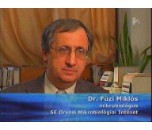
.jpg)











































































